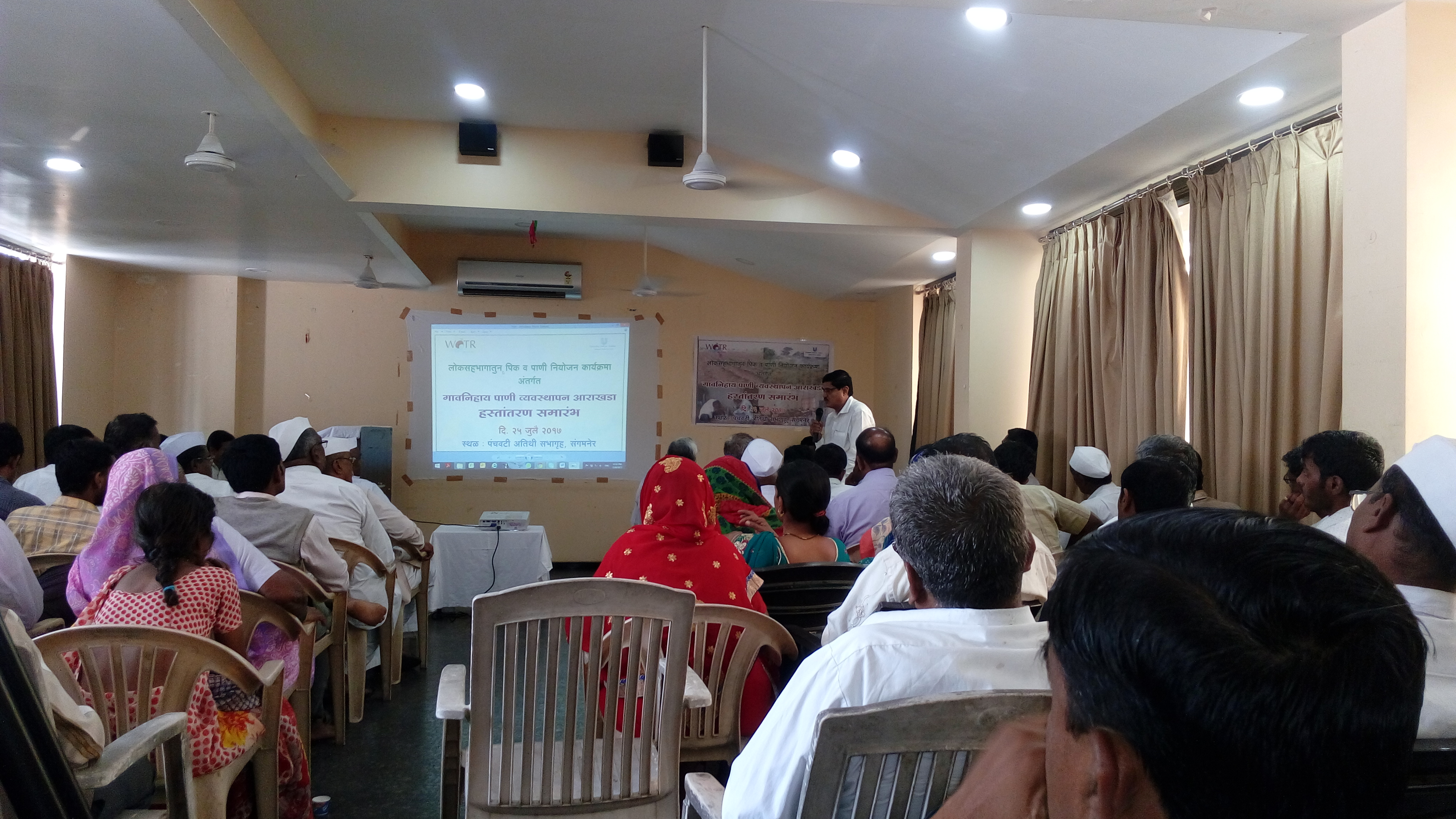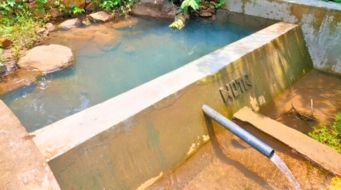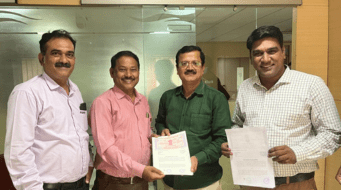-Isha Fuletra, Pragati Khabiya, Shamkant Patil and Eshwer Kale
With depleting groundwater and drastic climatic changes, the issue of water scarcity poses a greater challenge to the rainfed villages in India. In the case of a semi-arid region like Ahmednagar district of Maharashtra state, the problem of water management is further aggravated by the climatic changes- erratic rainfall and frequent droughts. Fortunately, this year (2017-18) a good monsoon was observed in most parts of the region. The villagers had fair amount of water available for all their needs. However, this also cautions them to follow better and efficient water management practices, to avoid the possibility of the water crisis in the time ahead.
In response to such a need, WOTR’s, Water Stewardship Initiative, in collaboration with Hindustan Unilever Foundation (HUF), is being implemented in 106 villages of Maharashtra and Telangana to facilitate and promote efficient water-use practices that are, economically efficient, socially judicious and environmentally sustainable. As a part of this initiative, the village stakeholder representative teams (VSRTs) are trained to undertake the responsibility of sustainably using local water-resources, for which they prepare water stewardship plans while working with their respective communities. Along with water harvesting and saving plans, water budgeting forms an important component of the water stewardship plans. Moreover, communities collectively decide on social rules and norms to facilitate the implementation of the plans designed by them.
Stakeholder engagement workshops are organised at cluster and village level where different stakeholders groups, like water stewards, government officials, and other experts in the field of water and agriculture come together to discuss, understand and have an agreement on different water related issues. The discussions help the water stewards get a larger perspective on issues like climate change, water scarcity, pros and cons of different water harvesting treatments, need for social norms at village level and so on. Till today, 60 stakeholder engagement workshops have been arranged, where more than 2000 village stakeholders and several government officials have participated.
On 26th July 2017, a workshop for stakeholders from 3 blocks of Ahmednagar district, namely Sangamner, Akole and Parne was organised at Sangamner . The one-day workshop had 110 members of Village Stakeholder Representative Teams (VSRTs) from 58 villages as participants . While Mr. Musmade, Sub Divisional Agriculture Officer, Sangamner was the the chief guest, other government officials present were – Mr. Nawale (TAO, Sangamner), Mr. Shinde (BDO, Sangamner). Mr. Argade (Agriculture Officers, Panchyat Sammitti Sangamner), Mr. Vaibhav Kanavade, Block level officer of Agricultural Technology Management Agency ( ATMA), Sangamner and Mr. Sutar (RFO-Forest Department, Sangamner). After, the inauguration ceremony Mr. Eshwer Kale, from WOTR, briefed guests about the Water Stewardship Initiative and emphasized on public ownership nature of water. He talked about the need for various stakeholders- villagers, government officials and the NGOs- to come together and work in coordination to resolve different water challenges.
Follwed by, Mr. Hemant Pinjan from WOTR explaining the role of various knowledge partners like Mahatma Phule Krishi Vidyapeeth (MPKV), Vasantrao Naik Marathwada Krishi Vidyapeeth (VNMKVP), India Meteorological Department (IMD) and Central Research Institute for Dryland Agriculture (CRIDA) in strengthening WOTR’s work.
The introduction of the program was followed by the VSRT’S sharing their roles and responsibilities in the water stewardship initiative. Pandurang Kachare of village Palsude, Akole block explained the process of preparing community plans and water budgeting reports for his village. Ganpat Bhagaji Hande of village Bhojdari ,Sangmer block talked about how water harvesting and water use efficiency plans were prepared.
Addressing the audience, Mr. Musmade, (Sub Divisional Agriculture Officer), shared the story of how he had managed to get higher and better quality pomegranate by adopting drip irrigation, mulching paper, and organic manures. He also stressed on the urgent need to balance the demand and supply of water in a given locale. Mr. Nawale, Taluka Agriculture Officer (TAO), Sangamner added that if fifty project villages succeed to manage without water-tankers, then the government would be able to save expenditure on public tanker supply. With this, he assured that villages covered under Water Stewardship Initiative would be given preference for availing government schemes to balance the demand and supply of water at the block level. Mr. Shinde, Block development Officer,(BDO) from Sangamner suggested that the focus of the community level plans should be more on repairing the old water-harvesting structures rather than constructing new ones. He also shared information on various government schemes for drip irrigation, sprinkler, farm pond, horticulture that the communities could avail. Mr. Argade,Agriculture officer-Panchayat Samiti, Sangamner insisted that every village should put a ban on bore wells, or should make sure that the water is not lifted from deeper aquifers and encouraged the villagers to implement well-recharge programs in the villages as well. Concluding the session, Mr. Sutar, Range Forest officer, Sangamner and Vaibhav Kanavade ,Block-level officer from ATMA, Sangamner appreciated the initiative and the efforts of villagers.

On a concluding note, the representatives of VSRTs presented the “Water Stewardship Plans 2017” of 58 villages of Akole, Sangamer and Parner to the government officials. Also,with the efforts of Prashant Kalasakar, Shamkant Patil, Arun Dahale and Mahesh Shelke, all from the WOTR team, the workshop turned out be a great success in brigingthe VSRTs representatives and the government officals on a common platform and was successful to draw their attention on the changes the water stewards wish to bring about in their villages. It contributed greatly in building trust among the villagers and the government officials and to work towards the common goal of achieving appropriate water management.







2 thoughts on “Building bridges: Engaging Stakeholders for strengthening Water Stewardship”
With the efforts of Prashant Kalasakar, Shamkant Patil, Arun Dahale and Mahesh Shelke, all from WOTR, the workshop turned out be a great success in brigingthe VSRTs representatives and the government officals on a common platform.
Thank you for sharing sir!